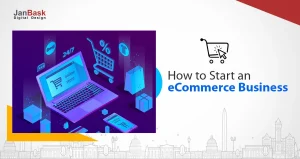
So you want an online store but need to know which platform to choose? You may have heard about WooCommerce and Shopify, but you must know which suits your needs best. Both have individual advantages, but they also have some disadvantages. We hope to help you open the door of knowledge to let in more opportunities for growth and prosperity for your eCommerce venture. Thus, we'll help you make a better choice by analyzing the pros and cons of Shopify and WooCommerce.
The success of your online business is linked to understanding the features of each platform. So, you must learn to differentiate between their uniqueness and their ways. We intend to make choosing your eCommerce store easier, supporting business growth through a more informed decision-making process.
Shopify has long been among the leading platforms for online businesses selling multiple products. Judging from its user-friendly editor, responsive templates, and scalable nature, what about WooCommerce?
Shopify is a specialized online selling website, yet WooCommerce is just a mere e-commerce component that runs on WordPress. This means you’ll need to go through more steps when setting up WooCommerce, like getting a domain name for your site and its host, installing a plugin, and modifying the store through programming.
Ready to choose the perfect platform for your eCommerce store?

WooCommerce is such a giant today because it is free to use. When someone creates an account on WordPress, they will be prompted automatically to do that, making it easy for new users who want to get started fast. Using WooCommerce has a learning curve, so you should devote time to creating your online store.
On the other hand, Shopify is simple from the moment you start, and you can optimize it for search within some hours. The downside is that it is less customizable than WooCommerce because of its closed-source nature.
However, these aren’t the only things to compare. Thus, we shall examine each platform to help you choose what best suits your needs. Here is a point-by-point comparison between Woocommerce and Shopify for your ease.

In the world of e-commerce, Shopify and WooCommerce remain two well-known platforms. Although selecting a platform solely based on its popularity is foolish, reviewing the number of users using each makes sense. Higher authority websites might favor WooCommerce over others because of its popularity. Nonetheless, these platforms have enough room for growth within the enterprise sector:
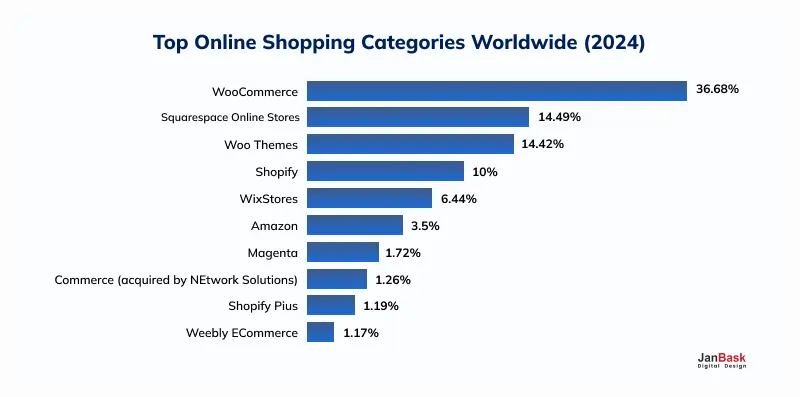
However, when comparing the search interest for Shopify vs WooCommerce, Shopify has garnered more popularity than WooCommerce. Even though Shopify is an entity unto itself, it should be noted that WooCommerce is connected to the world’s best-known CMS. Regarding these figures, WooCommerce is highly regarded among its fellow e-commerce platforms. Millions exist for those already owning a WordPress site, making WooCommerce more appealing.
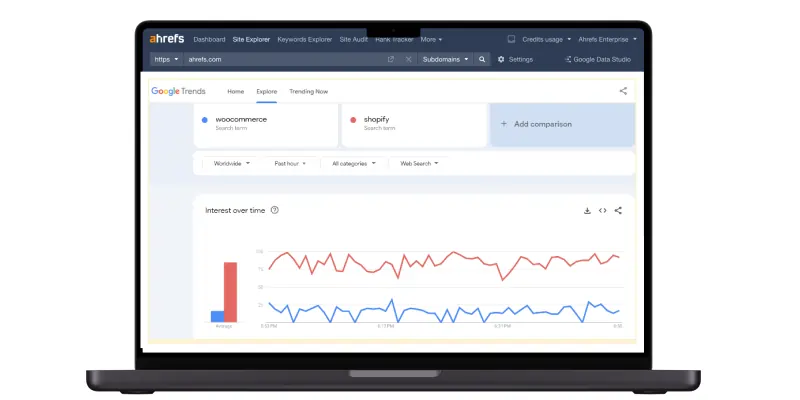
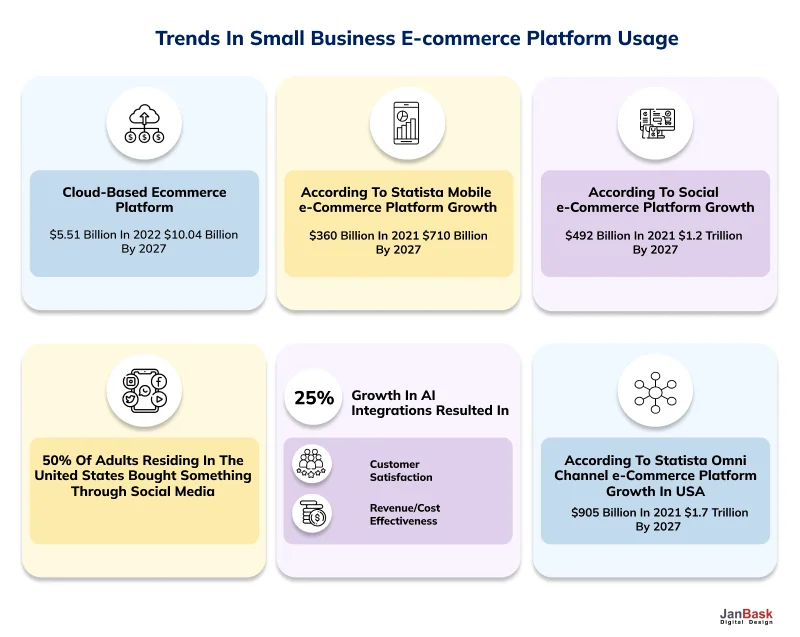 Given the statistics in the infographic above, you’d know which features to look for in your eCommerce platform: Shopify, WooCommerce, or any other. Moreover, considering the increasing requirement for businesses’ eCommerce solutions that are more flexible and affordable, such businesses are likely to select cloud-based platforms.
Given the statistics in the infographic above, you’d know which features to look for in your eCommerce platform: Shopify, WooCommerce, or any other. Moreover, considering the increasing requirement for businesses’ eCommerce solutions that are more flexible and affordable, such businesses are likely to select cloud-based platforms.
These digital solutions have a rapid expansion potential with no initial heavy investments, enabling start-up online stores with low maintenance demands. For today’s entrepreneurs, cloud-based eCommerce is steadily taking its place to satisfy their constantly changing expectations in developed virtual markets. Regardless of your choice, your eCommerce platform’s must-have features include: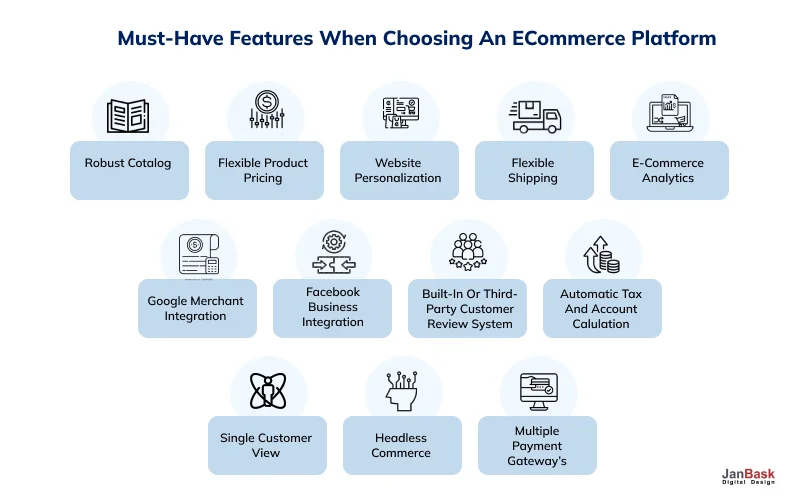
Technologically, Shopify can be defined as a sales platform based on subscriptions that provide software as a service (SaaS). The primary standard store subscription plans offered by Shopify come with fees starting from $29 monthly. Each standard plan supports a branded online store and all necessary tools for selling in person or online. A “Lite” plan is available for just $9 a month. The online store is not included, but it allows for selling using mobile POS sales and putting a Buy Button on other websites, blogs, or emails.
All plans offer a comprehensive set of tools for business management. Every plan on Shopify includes essential functions such as product sourcing, sales tracking and inventory management, payment processing, shipping, customer accounts, marketing, and reporting. Moreover, enlarging your Shopify toolbox using hundreds of different applications is easy. Read more in our Shopify review. Here are some more uncommon facts about Shopify:
WordPress is the best and most powerful CMS globally regarding web presence. On the other hand, WooCommerce holds an overwhelming share in that segment, being the WordPress e-commerce plugin. A wide range of use among individuals, companies, and organizations is observed in its usage. The variety and novelty of its function leave one trying to figure out where to turn next. To give you a taste of things WooCommerce can do. Come along as we discover more amazing statistics and interesting facts about it. Here we go!
Some prominent companies use WooCommerce for their web pages. A report from trends made by, reveals that the company has a wealth of data with more than five million results. Some well-known players in this industry are Themeforest, Transmitter, Hotstar, Forbes, CodeCanyon, ElegantThemes, and Pinterest, among others. Additionally, most of these sites have considerable value in terms of economy, and their technology spending and revenues run into thousands. For instance, it is stated that USD 608,000+ was generated from sales on CodeCanyon while massive traffic keeps visiting it every day. Here are some more essential facts about WooCommerce:
While both platforms offer unbeatable perks and benefits in their own right, we are responsible for making you aware of the demerits associated with each to empower you with more informed decision-making.
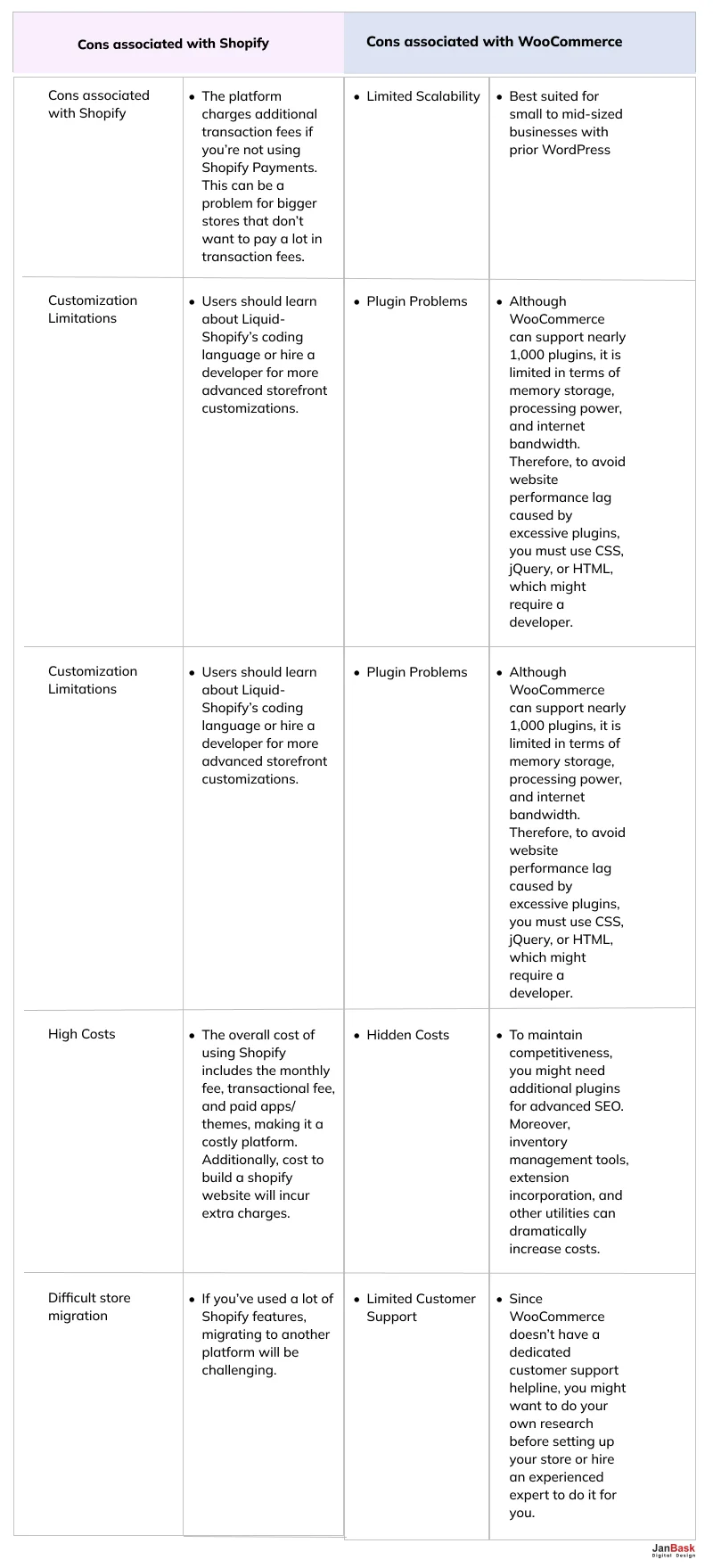
Shopify suits individuals seeking a comprehensive, easy-to-use e-commerce platform featuring trustworthy web hosting and integrated tools. Conversely, users conversant with WordPress and desire more flexibility and control over their shop's appearance and operational aspects find WooCommerce the best choice. The user-friendly interface of Shopify makes it easy for anyone to use while offering excellent customer service; however, one has to pay monthly fees. WooCommerce, on the other hand, is free to download but requires a WordPress site and more plugins, thus escalating the overall expenditure. Your technological capabilities, available financial resources, and preferences will determine your choice.
Switching from WooCommerce to Shopify can make store management more accessible, which provides an all-in-one solution with integrated hosting, security, and support. Shopify's user-friendly interface minimizes the need for technical maintenance and makes scaling easier. The fact that it is optimized for e-commerce results in better performance and faster load times. Moreover, migrating to Shopify can simplify updates and app integration, eliminating the need for various plugins. Shopify remains one of your best picks if you like a managed platform free from stress.
Compared to each other, both WooCommerce and Shopify are very friendly regarding Search Engine Optimization (SEO). However, they take different approaches to their solutions designed for the same purpose. For example, beginner users find it easy to set up their sites on Shopify since there are built-in features that will help increase the visibility of a site. On the other hand, an experienced user is likely to choose WooCommerce because this plugin can be customized in various ways, and it has advanced plugins that support search engine optimization, such as Yoast SEO. When we talk about speed and mobile performance optimization, there is one thing we must pay attention to within Shopify's framework regarding boosting SEO. On the other hand, WooCommerce offers greater flexibility in certain aspects of SEO, making it ideal for those who know what they are doing in search engine optimization.
WooCommerce is an excellent choice for people who have used WordPress before because it offers lots of customization options. With many plugins and themes, you can make your store function precisely as you want. WooCommerce works well with any size or type of company by being flexible and scalable. In addition, it allows complete ownership and control over your site. If you have some technical knowledge or can hire someone to help you develop it, the initial costs are much cheaper than those of other platforms when using WooCommerce, which has more advanced features.
WooCommerce is not recommended for individuals wanting basic and simple solutions with management systems since it requires some technical installation and subsequent maintenance. Complexities associated with WordPress installations, making the use of extra plugins necessary to get the most out of it, hinder effective utilization at times. One can experience performance or speed-related issues when they are not optimized well or when the account has many active plugins. Other costs may arise, such as hosting expenses, premium theme purchases, and other additional plugins apart from what has already been mentioned. You might prefer using Shopify if you emphasize running an automated ecommerce platform because this makes things easy for you.
Whether there's a better option than WooCommerce depends on your specific needs. Shopify is a popular alternative for those seeking a managed e-commerce solution with ease of use and built-in features. Magento services is another option for larger businesses needing high customization and scalability. BigCommerce and Wix eCommerce also offer robust features with varying levels of ease and flexibility. Each platform has strengths, so that the best choice will depend on your business size, budget, and technical capabilities.
WooCommerce is free to download and use, but running a WooCommerce store involves additional costs. You'll need a WordPress website, which requires hosting and a domain name. Pay extensions, themes, and plugins provide many features and functionalities. While the core plugin is free, the overall cost of maintaining a WooCommerce store can add up depending on the additional tools and services you require.
WooCommerce can make your site look sluggish if you don't manage it well. Excessive plugins, bad theme coding, or bad hosting may lead to performance complications. There are ways of countering such lags via optimization, trustworthy hosts, and frequent updates on plugins and themes employed. Caching solutions and content delivery networks (CDNs) are practical tools to accelerate site speed. Correct handling of your WooCommerce store can help achieve maximum performance.
WooCommerce is free, but running a fully functional store often involves additional costs. You'll need to pay for web hosting, a domain name, and potentially premium themes or extensions to enhance your store's functionality. Some plugins that provide essential features may also have associated costs. While you can start with the free version, the overall cost of running a WooCommerce store can vary depending on your needs and choices.
The difference between choosing Shopify services or WooCommerce services mostly depends on your requirements as a business person, your technical skills, and how much money you have. If you want easy installation accompanied by reliable hosting and built-in features, Shopify is a good option because it offers a comprehensive one-stop e-commerce solution.
Those acquainted with WordPress can use WooCommerce, which gives them more flexibility and control over their websites; however, this platform requires a lot of management since everything is done manually, including customization, which usually comes at an extra cost.
Both platforms support all kinds of businesses regardless of size regarding search engine optimization, so you must consider whether you prefer ease of use over customizability and control. Determining your particular needs will help you decide which platform best suits them.
Interested in our eCommerce Services?

Z
Great comparison. Would love to see comparisons for some of the other ecommerce platforms as well (Magento and BigCommerce).
M
This blog will be extremely helpful when my clients and prospects ask about the advantages and limitations of each. Thank you so much!
L
Good stuff! I used to believe Shopify was a clear winner with so many big clients however now I am comfortable with WordPress and would rather stay away from monthly subscription fees!
C
This was extremely helpful and easy to understand the differences while comparing the two options!
F
Brilliant and very comprehensive comparisons, now I have a clear picture before I choose WordPress.
Z
Hi, In terms of performance, which platform is better?
E
Such a detailed and informative blog. I have a question though, is it true that Shopify charges an extra 2% fee for using other payment gateways like PayPal on their platform?
W
Thanks for such an insightful blog. I’m leaning towards Shopify because of a time constraint and easy-to-use factor.
D
Such a clear and concise blog, easy to pick the differences
C
Hi, I’ve heard a lot of people saying WOO isn’t secure and safe, is it true? would I have to buy a VPN?
C
I didn’t know the difference between Shopify and Woocommerce, though I have heard about them from my friends. But thanks to your blog details I got it clear in my mind. Thanks Team!
H
Great comparison. Would love to see comparisons for some of the other ecommerce platforms as well (Magento and BigCommerce).